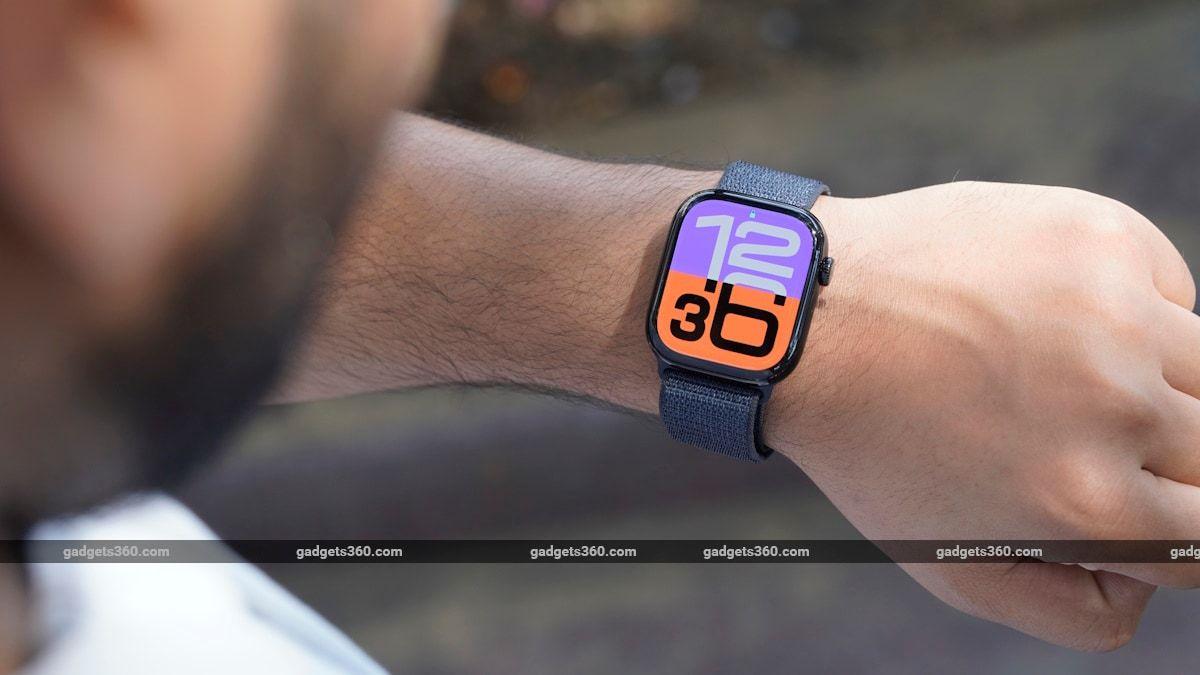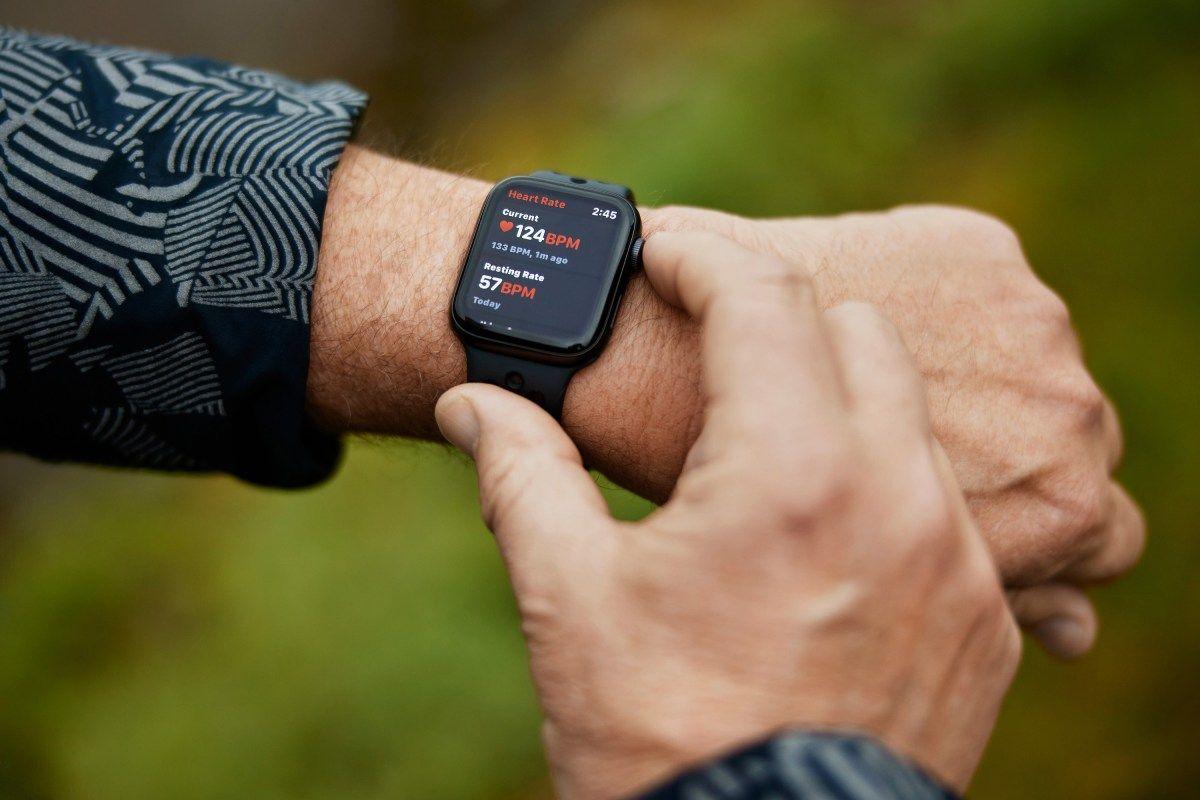Apple's New AI Model Revolutionizes Health Predictions Using Apple Watch Behavioral Data
3 Sources
3 Sources
[1]
New Apple Watch AI Model Can Reveal Hidden Health Conditions
A new Apple-backed AI model trained on Apple Watch behavioral data can now predict a wide range of health conditions more accurately than traditional sensor-based approaches, according to a recently published study. The research paper, titled "Beyond Sensor Data: Foundation Models of Behavioral Data from Wearables Improve Health Predictions," introduces a machine learning model that analyzes user behavior to flag potential health issues. Unlike earlier methods that focus on real-time sensor outputs like heart rate or blood oxygen, the new model identifies patterns in how people move, sleep, and exercise over time. At the center of the study is a foundation model that the researchers call the Wearable Behavior Model (WBM). It analyzes high-level behavioral metrics such as step count, sleep duration, heart rate variability, and mobility, which are all calculated by the Apple Watch using on-device algorithms. The researchers found that this approach allows the AI model to detect certain health conditions more effectively than models based solely on direct biometric data. The WBM showed particularly strong performance in identifying what the researchers called static health states, such as whether a person takes beta blockers, and transient health conditions like sleep quality or respiratory infection. For pregnancy detection, the model achieved up to 92% accuracy when combined with traditional biometric data in a hybrid approach. Apple collected data for the model through the Heart and Movement Study, which involves more than 160,000 participants who voluntarily share data via the Apple Watch and iPhone. The foundation model was trained on over 2.5 billion hours of data and evaluated on 57 different health-related prediction tasks. It uses a time-series machine learning architecture designed to identify changes in behavior over days or weeks, allowing it to identify health conditions that unfold over time rather than instantaneously. The researchers argue that wearable devices have now evolved to the point where they can support this kind of AI-powered analysis at scale. Whether such a model will be integrated into a user-facing feature in the future is unknown, but it goes to show that current Apple Watch hardware can go much further in terms of accurate and intelligent health analysis.
[2]
Your next Apple Watch could have this massive AI health upgrade - and no new sensors are needed
But it raises questions over the privacy of your sensitive health data There's a lot of doom and gloom surrounding artificial intelligence (AI) these days, and it's justified in many cases. But one area where AI can potentially make a hugely positive impact is in healthcare, and it looks like Apple is considering whether machine learning power can bolster health metrics in future Apple Watch models. There's no guarantee it'll make it into a finished product, but if it does, it could upend how you manage your wellbeing through the wearable. That idea comes from a recent research paper published by Apple's Machine Learning Research arm. There, the company states that a new AI model trained on Apple Watch behavioral data is able to predict a wide array of health ailments. Impressively, Apple claims that the model is able to detect these conditions more accurately than the sensors you'll typically find in many of the best smartwatches today. While traditional wrist-based health analytics work by scanning real-time data directly provided to them by your wearable's sensors, the AI model is instead able to spot patterns in the way you exercise, move and sleep. It then uses that information to identify any potential issues with your wellbeing. Apple says that its AI model - dubbed the Wearable Behavior Model, or WBM - is particularly good at recognizing the signs of pregnancy, where it achieved up to 92% accuracy when combined with biometric data. The model was also a strong performer when it came to determining static health states - such as whether you're taking beta blockers - and transient health conditions like sleep quality. AI models have generated a lot of controversy over the ways they are trained, with journalists, artists and more arguing that their works have been used without permission by AI companies. How does Apple's reputation for watertight privacy controls square with this concern when it comes to the Apple Watch's AI model? Well, the model's training data apparently came from Apple's Heart and Movement Study, where 160,000 participants voluntarily shared their health data through iPhones and Apple Watches. Over 2.5 billion hours of data were used to shape the model, and it was tested across 57 different health-related tasks. Still, there remain significant privacy concerns over the combination of AI and health analytics, such as when it comes to pregnancy data. With reproductive rights being rolled back in many places, the idea of this kind of information being fed into an opaque AI algorithm - even one produced by privacy champion Apple - will be an uncomfortable prospect for many. It also comes at a time when United States Secretary of Health and Human Services Robert F. Kennedy Jr. has pledged to "make America healthy again" by encouraging every American to own a wearable within four years. How will AI figure in such a plan? We don't know for sure, but if Apple's AI makes it into the Apple Watch, we could soon find out.
[3]
Apple Researchers Build AI Model That Predicts Health Via Behavioural Data
The AI model was trained on data from 162,000+ Apple Watch users Typically, this data is avoided due to high volume and noise Researchers found that raw sensor data can be inadequate Apple researchers, in collaboration with the University of Southern California, have developed a new artificial intelligence (AI) model that tracks behavioural data over sensor signals. The new research builds on prior work by the Apple Heart and Movement Study (AHMS) and was aimed at understanding if behavioural data, such as sleep pattern and step count, can be a better determinant of a person's health compared to traditional indices such as heart rate and blood oxygen level. As per the paper, the AI model performed surprisingly well, even if with some caveats. The study, titled "Beyond Sensor Data: Foundation Models of Behavioral Data from Wearables Improve Health Predictions" was published in the pre-print journal arXiv and is yet to be peer reviewed. The researchers set out to develop an AI model, dubbed Wearable Behaviour Model (WBM), that relies on processed behavioural data from wearables such as how long a person sleeps and their REM cycles, daily steps taken and gait, and how their activity pattern changes over the week. Traditionally, to predict or assess someone's health, wearable health research has typically focused on raw sensor readings such as continuous heart rate monitoring, blood oxygen levels, and body temperature. The study believes that while this data can be useful at times, it also lacks the full context about the individual and can have inconsistencies. Regardless, so far, behavioural data, which is also something most wearables process, has not been used in systems as a reliable indicator of a person's health. There are two main reasons for it, according to the study. First, this data is much more voluminous compared to sensor data, and as a result, it can also be very noisy. Second, creating algorithms and systems that can collect and analyse this data and reliably make health predictions is very challenging. This is where a large language model (LLM) comes in and solves the analysis problem. To solve the noise in data, researchers fed the model with structured and processed data. The data itself comes from more than 1,62,000 Apple Watch users who participated in the AHMS research, totalling more than 2.5 billion hours of wearable data. Once trained, the AI model used 27 different behavioural metrics, which were grouped into categories such as activity, cardiovascular health, sleep, and mobility. It was then tested across 57 different health-related tasks, such as finding out if someone had a particular medical condition (diabetes or heart disease) and tracking temporary health changes (recovery from injury or infection). Compared to the baseline accuracy, researchers claimed that WMB outperformed in 39 out of 47 outcomes. Comparison between performance of the WBM model the test model and the combination of both Photo Credit: Apple The findings from the model were then compared with another test model that was only fed raw heart data, also known as photoplethysmogram (PPG) data. Interestingly, when individually compared, there was no clear winner. However, when researchers combined the two models, the accuracy of prediction and health analysis was measured to be higher. Researchers believe combining traditional sensor data with behavioural data could improve the accuracy in the prediction of health conditions. The study stated that behavioural data metrics are easier of interpret, align better with real-life health outcomes, and are less affected by technical errors. Notably, the study also highlighted several key limitations. The data was taken from Apple Watch users in the US, and the broader global population was not represented in this. Additionally, due to the high price of wearable devices that accurately collect and store behavioural data, accessibility of preventive healthcare also becomes a challenge.
Share
Share
Copy Link
Apple researchers have developed an AI model that analyzes behavioral data from Apple Watches to predict health conditions more accurately than traditional sensor-based approaches, potentially transforming wearable health technology.
Apple's Groundbreaking AI Model for Health Predictions
Apple, in collaboration with the University of Southern California, has developed a revolutionary AI model that could transform how wearable devices predict and monitor health conditions. The new model, called the Wearable Behavior Model (WBM), analyzes behavioral data from Apple Watches to identify potential health issues more accurately than traditional sensor-based approaches
1
2
3
.
Source: Gadgets 360
The Power of Behavioral Data
Unlike conventional methods that rely on real-time sensor outputs like heart rate or blood oxygen levels, the WBM focuses on patterns in user behavior over time. It examines high-level behavioral metrics such as:
- Step count
- Sleep duration
- Heart rate variability
- Mobility
These metrics are calculated by the Apple Watch using on-device algorithms
1
. The AI model's ability to detect changes in behavior over days or weeks allows it to identify health conditions that develop gradually, rather than instantaneously1
.Impressive Performance and Accuracy
The WBM has shown remarkable performance in various health-related prediction tasks:
- Static health states (e.g., use of beta blockers)
- Transient health conditions (e.g., sleep quality, respiratory infections)
- Pregnancy detection (up to 92% accuracy when combined with traditional biometric data)
1
2
The model was trained on over 2.5 billion hours of data from more than 160,000 participants in the Apple Heart and Movement Study. It was then evaluated on 57 different health-related prediction tasks
1
3
.Combining Behavioral and Sensor Data
Researchers found that combining the WBM with traditional sensor-based models yielded even higher accuracy in health predictions. This hybrid approach could potentially provide a more comprehensive and reliable health analysis for Apple Watch users
2
3
.
Source: TechRadar
Related Stories
Privacy Concerns and Limitations
While the potential benefits of this AI-powered health analysis are significant, the study raises important questions about privacy and data security. The use of sensitive health information, particularly in areas like pregnancy detection, could be concerning for some users
2
.Additionally, the study acknowledges several limitations:
- Data representation: The study only included Apple Watch users in the US, limiting its global applicability
3
. - Accessibility: The high cost of wearable devices capable of accurately collecting and storing behavioral data may limit access to this technology
3
.
Future Implications
Source: MacRumors
The development of the WBM demonstrates that current Apple Watch hardware has the potential for more accurate and intelligent health analysis. While it's unclear whether this model will be integrated into a user-facing feature in the future, it represents a significant step forward in AI-powered health monitoring
1
2
.As wearable technology continues to evolve, the combination of AI and health analytics could play a crucial role in preventive healthcare and personalized wellness management. However, balancing the benefits of these advancements with privacy concerns and accessibility issues will be essential for widespread adoption and acceptance
2
3
.References
Summarized by
Navi
[2]
Related Stories
Recent Highlights
1
ByteDance Faces Hollywood Backlash After Seedance 2.0 Creates Unauthorized Celebrity Deepfakes
Technology

2
Microsoft AI chief predicts artificial intelligence will automate most white-collar jobs in 18 months
Business and Economy

3
Google reports state-sponsored hackers exploit Gemini AI across all stages of cyberattacks
Technology








